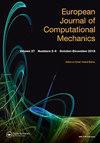Free Vibration Analysis of Functionally Graded Carbon Nanotube-Reinforced Higher Order Refined Composite Beams Using Differential Quadrature Finite Element Method
IF 0.6
Q3 MECHANICS
引用次数: 2
Abstract
Present paper deals on the free vibration investigation of carbon nanotube-reinforced composite (CNTs) beams, based on refined third order shear deformation finite element beam theory. The particularity of this model is that, it can capture shear deformation effect without using of any shear correction factor by satisfying shear stress free at free edges. The carbon nanotubes are supposed to be immersed in a polymeric matrix with functionally graded pattern across the thickness direction of the beam, and their material properties are evaluated using the rule of mixture. The differential equations of motion and related boundary conditions are extracted using Lagrange’s principle and solved employing a robust numerical tool called, Differential Quadrature Finite Element Method (DQFEM) for the first time, with high convergence speed, fast calculus performance as well as a good numerical stability. The obtained results have been validated with those available in literature, in order to show the correctness of the present model. Afterwards, a deep parametric study is performed to examine the effects of various geometrical and material parameters on the vibration behavior of FG-CNTs beams.用微分正交有限元法分析功能梯度碳纳米管增强高阶精细复合梁的自由振动
本文基于精细化三阶剪切变形有限元梁理论,对碳纳米管增强复合材料梁的自由振动进行了研究。该模型的特殊之处在于,通过满足自由边缘处的无剪应力,无需任何剪切修正因子即可捕捉剪切变形效果。将碳纳米管浸入具有沿光束厚度方向梯度的聚合物基体中,并利用混合规律评价其材料性能。利用拉格朗日原理提取运动微分方程及相关边界条件,并首次采用一种鲁棒的数值工具微分正交有限元法(DQFEM)进行求解,具有收敛速度快、演算速度快、数值稳定性好等优点。所得结果与文献中已有的结果进行了验证,以表明模型的正确性。随后,进行了深入的参数研究,以检查各种几何和材料参数对FG-CNTs梁的振动行为的影响。
本文章由计算机程序翻译,如有差异,请以英文原文为准。
求助全文
约1分钟内获得全文
求助全文

 求助内容:
求助内容: 应助结果提醒方式:
应助结果提醒方式:


